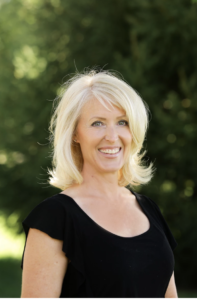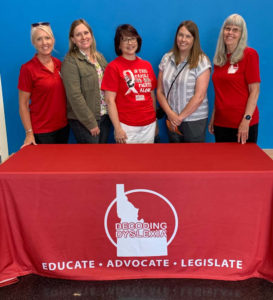Who Is Robin Zikmund?
 Robin Zikmund, a mom, noticed that her son began kindergarten unable to meet the academic milestones of a typical kindergartener. Teachers would state, “He’s a boy. This is normal for boys. Give it some time.” However, Robin felt something wasn’t right.
Robin Zikmund, a mom, noticed that her son began kindergarten unable to meet the academic milestones of a typical kindergartener. Teachers would state, “He’s a boy. This is normal for boys. Give it some time.” However, Robin felt something wasn’t right.
When her son was 8, he underwent a lengthy neural evaluation that diagnosed him with ADHD, dyslexia, and dysgraphia, a learning disability affecting his writing abilities. Two-hundred and eighty-seven minutes of his week spent in pull-out reading time was not helping because the educators were not trained in Orton-Gillingham or other methodologies that prove beneficial for students with dyslexia.
She fearlessly took this evaluation to her son’s school, only to be told that Idaho does not use the term dyslexia. He has a specific learning disability (SLD), and they assured her they were doing all they could to meet his needs and placed her son into a 12-week Reading Recovery program based on the “whole language” approach.
“Dyslexia is a multi-faceted, life-long, neurological condition that combines auditory, memory, and language-based learning difficulties. People with dyslexia lack the basic phonemic awareness that most individuals have, and they may have a hard time with reading comprehension, spelling, writing, vocabulary, and fluency.” (Orton-Gillingham & Dyslexia, Orton-Gillingham.com)
Robin explains, “As a parent, it was crushing to hear that limited resources were available to my child.” One day, she asked to sit in on a Reading Recovery session with her son and instructor. She watched her son read a story from a picture book and then was brought back through the book to read the words on the page. But he was utterly guessing the words based on the pictures.
At the end of his session, she witnessed the Reading Recovery instructor celebrate her son finishing the book incorrectly. She distinctly remembers the last word on the page being “canoe,” yet the instructor praised her son for ending the book with the word “boat.” Robin did not understand why this was praiseworthy. He was not reading; he was smart and very accurate at this guessing game.
“I immediately knew I had to do something about getting my son the proper dyslexia intervention that he so badly needed,” Robin says, “but Idaho was so behind and did not have the resources that many other states have available.”
So, in 2018, Robin founded the Idaho chapter of Decoding Dyslexia (DDID), a movement dedicated to increasing access for public schools to educational interventions and teacher professional development for students with dyslexia. Since DDID’s founding, Robin has helped make a significant impact on dyslexia legislation in Idaho.
Robin Zikmund Makes an Impact on Idaho Dyslexia Legislation
Idaho was the last state to adopt a chapter of Decoding Dyslexia. Robin notes, “Most states seem to avoid dyslexia. I’m not sure why? Maybe because no two students with Dyslexia look alike, and it overwhelms our schools on how to recognize the characteristics of Dyslexia and how best to support these students. But it’s quite simple, really. Effective reading instruction that is necessary for our Dyslexic students is good for all students. We simply need to shift the approach to teaching reading for all kids and offer an even deeper dive for our Dyslexic students.”
One of the first things Robin did to make an impact was join a special education advisory panel at the state department of education which includes both educators and parents who are impacted by a child with disabilities. The initial reaction to Robin’s concerns showed no interest, which made her feel that she didn’t belong. However, she did belong because 20% of children have this #1 hidden disability, and only 3% or less have a visible disability.
For the longest time, Idaho was the only state in the country not to have any legislature to provide resources for students with dyslexia. Robin brought a 2015 letter from the US department of education that states, “We can and should be using the terms dyslexia, dysgraphia….” to a 2018 meeting with her son’s special education teacher and supervisor. After they stated that they don’t call dyslexia by its name, they mentioned that they had never seen this 2015 letter.
Robin began combining her efforts for change with others who were just as passionate about seeing a change in how schools in Idaho combat dyslexia. Some of those who have joined her efforts include Dr. Sally Brown, a dyslexic literacy specialist who shares a similar story as Robin. Another is Dr. Kim Zeydel, a math teacher and 2015 Idaho state teacher of the year, who is dyslexic.
Robin and her team believed that the story of a parent directly affected by the lack of support would change legislation.
She declares, “I’m in it for the kiddo who doesn’t have the mom who has the time or who doesn’t have the financial resources to get the help they need. I am in it to change Idaho education to better support the 1 in 5 kids who do not have the resources necessary. Every child deserves to learn to read.”

Robin worked with legislators to draft House Bill 731 to help students with dyslexia. Idaho State Superintendent of Public Instruction Sherri Ybarra drafted House Bill 655 to focus on the same issues Robin and her team addressed in their bill. In 2021 Robin wrote a letter to Sherri Ybarra after multiple failed attempts to get her voice heard.
Finally, in April 2022, Idaho passed dyslexia legislation requiring students who are struggling with reading to receive dyslexia-specific screening and Idaho educators to receive dyslexia-specific professional development. And this fight is only just beginning as Robin and others at DDID continue to work to educate, advocate, and legislate for change for students with dyslexia in the Idaho public school system.
Robin Recruits IMSE to Make an Impact
Robin’s now 8th-grade son reads at a 2nd-grade level because she, unfortunately, trusted in the “just give it time” comments she heard.
Robin learned about IMSE and its use of the OG method early on when she joined the Decoding Dyslexia movement as a method of instruction that was considered adequate for those with dyslexia. Four years ago, Robin reached out. She states, “IMSE is directly connected to why we do what we do. The founder is an educator who saw an issue. They are a company that gets it.”
IMSE isn’t just for the dyslexic student; K-3 teachers, special education teachers, and reading interventionists should have it. IMSE is progressive and stays up-to-date on its research.
Robin explains, “IMSE pairs well with LETRS. LETRS provides teachers with the why behind the Science of Reading, and IMSE provides the how by empowering teachers with effective strategies to take back to the classroom day one after training.”
After the Idaho Legislature passed a bill requiring dyslexia screenings for K-5 students and professional development for teachers, IMSE worked with local teachers to help train over 50 educators in the Orton-Gillingham method. Many of these educators paid out of their own pockets to attend this training, and a team of passionate Idaho educators worked with non-profits to raise $15,000 in scholarships for some of the participants.
Many who attended this training agreed that teaching a child with dyslexia is a personal cause. Just as Robin has, these educators are on a mission to make an impact on the resources provided to their students who deal with these hidden disabilities in the classroom.
Robin isn’t stopping here, though. She states, “The more training teachers get, the more effective we will be at reaching all children. My next phase is to try to encourage changes at the university level, so Orton-Gillingham and the Science of Reading are part of the core curriculum for every college student pursuing a career in education.”
Please connect with us on Facebook, Twitter, Instagram, LinkedIn, and Pinterest to get tips and tricks from your peers and us. Read the IMSE Journal to hear success stories from other schools and districts, and be sure to check out our digital resources for refreshers and tips.
